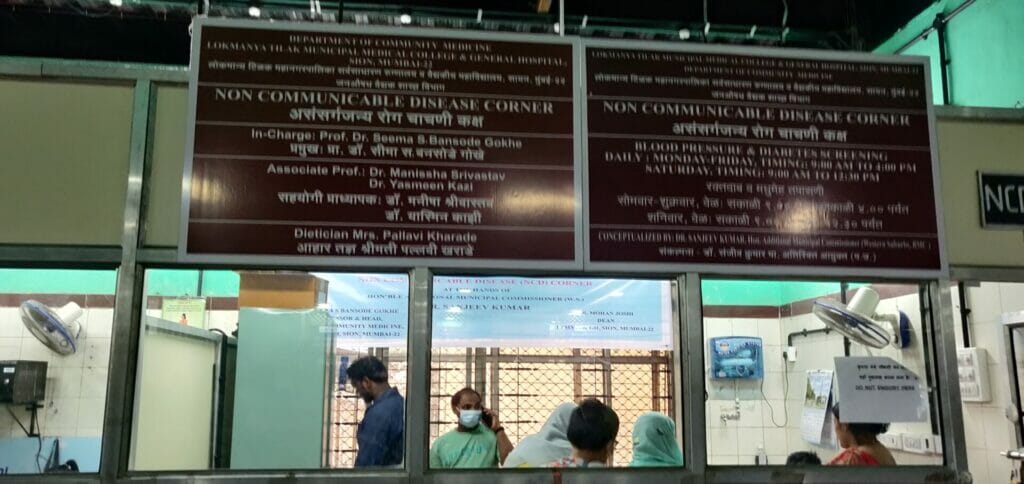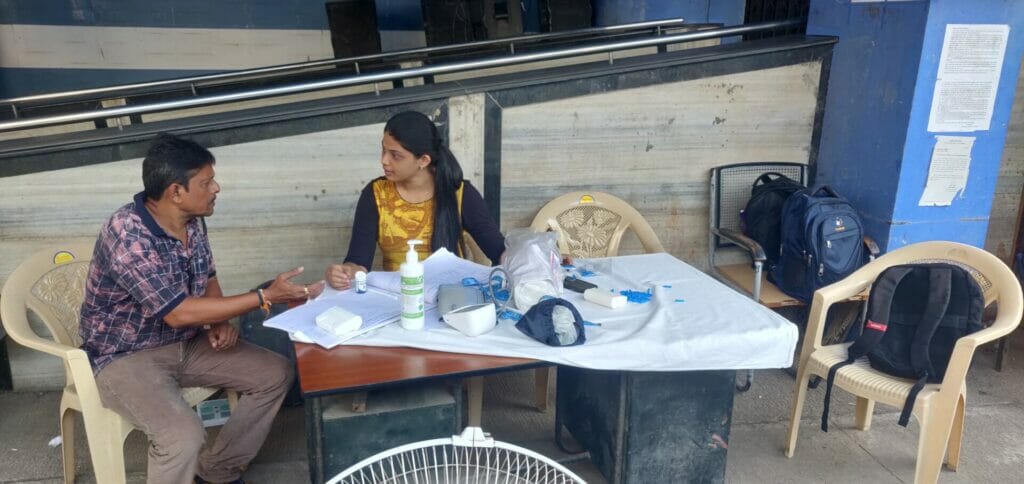On the morning of October 29th, 55-year-old Faiyaz Ahmed visited Lokmanya Tilak Municipal General Hospital (also known as Sion Hospital) along with his daughter for her medical check-up. However, he had no intention of getting himself checked. However, an announcement on the loudspeaker inside the hospital’s OPD building changed his mind. The announcement said that anyone above the age of 30 who wanted to get screened for diabetes and hypertension could visit the free-of-cost, walk-in Non-Communicable Disease (NCD) Centre.
“Abhi umar bhi ho gayi hai, socha sugar check karwa leta hoon. Kuch alag se taklif ho nahi rahi hai,” Ahmed says. (I have reached a certain age now so I thought it would be better to get my sugar levels checked. I am not showing any symptoms).
Established in September, first at Sion Hospital and then at 15 other civic hospitals, NCD centres are Brihanmumbai Municipal Corporation’s (BMC) bid to control the growing incidence of lifestyle diseases. Mumbai registered a total of 36,616 diabetes cases in 2021, the figure includes data from BMC hospitals and dispensaries as well as the state hospitals. In the same year, 26,478 cases were registered for hypertension. Meanwhile, cause of death data from the public as well as private facilities suggests there were 16,000 deaths due to diabetes in 2020 while 5,965 died due to hypertension.
Read more: RTI data with NGO casts a cloud over cause-of-death reporting in Mumbai
Detecting non-communicable disease early helps

Up until now, NCD centres have screened more than 14,000 people for diabetes and hypertension. Dr Mohan Joshi, the dean of Sion Hospital, says, “Under non-communicable disease, diabetes and hypertension become the roots of various other diseases like heart disease, kidney disease, stroke etc. The idea behind NCD centres is to intervene at an early stage and hence control it.”
Sion Hospital is a few minutes away from Dharavi and caters to a large slum population on a daily basis. There are five NCDs at centres at the hospital, the one on the ground floor of the OPD building sees heavy rush throughout the day.
Most patients who suffer from diabetes and hypertension are unaware of their condition as there are no symptoms, Dr Joshi says. “We screen about 350 to 500, out of which 20% may turn out to be positive.”
How non-communicable disease centres work
As specified above, NCD screening centres operate out of hospitals. Junior resident doctors and interns are stationed at the centres for screening and the total workforce at each NCD centre varies from hospital to hospital, depending on the footfall. Notably, it is also the hospital that decides upon the number of NCD centres it needs to establish.
The NCD centres across all the hospitals are open from 9 am to 4 pm, and function till 12:30 pm on Saturdays. They are equipped with weighing machines, measuring tape, a glucometer, a sphygmomanometer for blood pressure, cotton and a sanitiser.
In charge of one of the five NCD centres at Nair Hospital, Dr Subhasri Subhadarshini, a junior resident doctor, says, “On average, at my centre, we screen about 90 to 100 people daily.” When the footfall at all the five centres at the hospital is added up, it screens a little over 400 patients for diabetes and hypertension every day.

“When a person arrives, we first ask them for details like their name, age, area of residence, and their phone,” she says. They are then asked if they consume substances like tobacco and alcohol. “Furthermore, their family history is very important to us. We ask them if there is any known case of diabetes, hypertension, stroke or other cardiovascular diseases on either their paternal or maternal side,” says Dr Subhadarshini.
During the interview, a person arrived at the NCD centre and was asked if she was a PCOD or a PCOS (Polycystic Ovarian Disease/Syndrome) patient. “I asked her because she was a little obese, which could increase the risk of diabetes, hypertension along with PCOD and PCOS. Diabetes and PCOD can occur jointly too,” says Dr Subhadarshini.
After getting all the necessary details, a general physical examination is done where a person’s body mass index (BMI) is checked. “And then we measure blood pressure and blood sugar,” says Dr Subhadarshini.
People are informed about the lifestyle changes they need to bring about and are advised to visit a doctor either at the hospital’s out-patient-department or at their nearest community health centre for further diagnosis and treatment protocol if the blood sugar is high.
Plans to expand
It was Dr Sanjeev Kumar, Additional Municipal Commissioner (Health), who came up with the idea of creating walk-in NCD centres in Mumbai’s civic hospitals. “Non-communicable diseases are the major killers today and early detection can help. The problem is that most people don’t get diagnosed early and keep suffering for years together,” he says.
The NCD centres will also include cancer screening soon. “We have begun screening for hypertension and diabetes and soon we’ll add cancer screening as well. Our peripheral workers need to be trained for that; so we are in touch with Tata institute (Memorial Centre),” says Dr Kumar.
List of 15 hospitals equipped with NCD centres
| Medical College Hospitals | Number of NCD centres |
| Sion Hospital | 5 |
| Nair Hospital | 5 |
| Nair Dental College | 4 |
| Cooper Hospital | 1 |
| KEM Hospital | 1 |
| Peripheral Hospitals V. N Desai, Santacruz (E) K B Bhabha Hospital, Kurla MMM Shatabdi Hospital, Govandi Rajawadi Hospital, Ghatkopar BDBA Hospital, Kandivali MT Agarwal, Mulund | 1 each |
| Special Hospitals TB Hospital, Sewri Kasturba Hospital, Chinchpokli Eye Hospital, Kamathipura ENT Hospital, Fort | 1 each |
| Total | 26 |
Source: BMC, Health Department